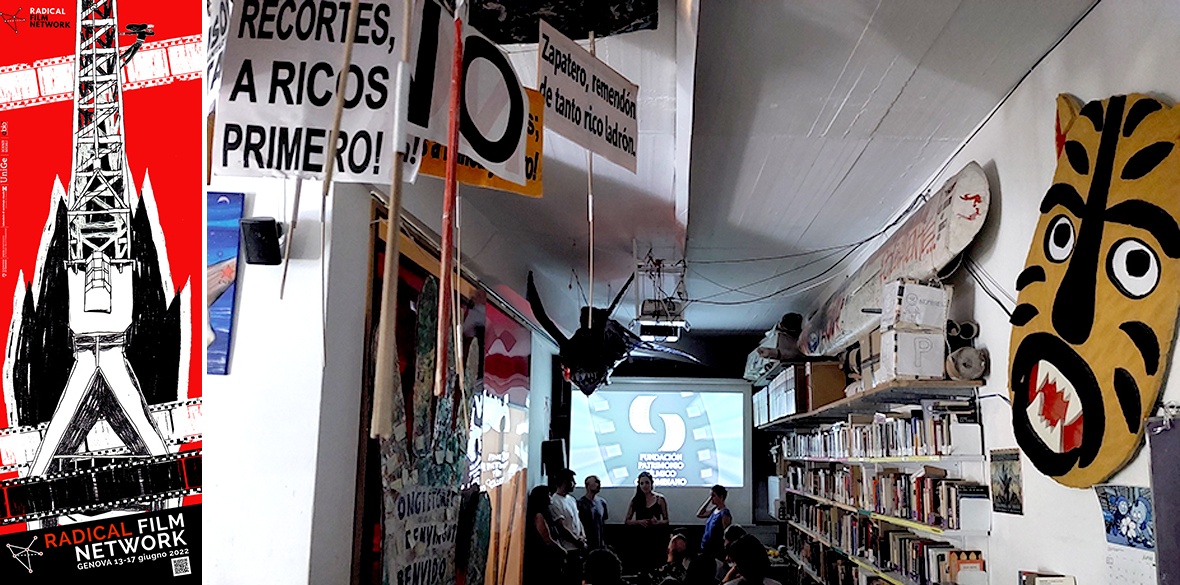This is the last article you can read this month
You can read more article this month
You can read more articles this month
Sorry your limit is up for this month
Reset on:
Please help support the Morning Star by subscribing here
THE RFN was originally established in London in 2013 by a group of film-makers, activists and academics as a collective to support the rapid growth in experimental and radical film culture at that time, primarily instigated by the rise of digital technology.
“Our inspiration was the Independent Filmmakers Association (IFA) which ran from 1974 to 1990,” says RFN co-founder, Steve Presence, who teaches film and TV studies at Bristol University. “The IFA was an amazing organisation that helped develop British independent film culture in the 1970s and 1980s and which was involved, to a significant degree, in the emergence of Channel 4 and the work it commissioned and broadcast in the 1980s and early ’90s.
“In 2013 you could see the need and potential to bring people together who were working in aesthetically innovative or experimental ways alongside more militant activist film-makers, as well as people interested in exhibiting this work via film clubs and festivals. This is a really lively and diverse film culture but remains overwhelmingly under-resourced, marginalised and fragmented.”
The group, born out of a sense of community, collaboration and solidarity, quickly expanded into a decentralised nationwide network, run by its members for its members, and its inaugural conference was held in Birmingham in 2015.
In turn, voluntary working groups were formed in order to carry out particular tasks such as organising film exhibitions, managing and maintaining the RFN website, its film library, its directory of affiliated organisations and, importantly, its ever-growing international mailing list.
Matthias Kispert, whose research at London’s University of Westminster includes migration and precarity, adds: “Although it has a strong base in the UK with many members and many activities happening, it was always conceived as an international initiative.”
Consequently, a steering group was set up to help with decision-making, to share responsibilities and to aid transparency and accountability.
“It was agreed at the Dublin conference in 2018 that we should have a steering group because the network was getting so big,” Steve Presence explains.
“Also,” Kispert continues, “we’ve been approached in the past to make public statements on behalf of the network in support of, for example, film-makers at risk of persecution in Iran or Turkey, and the steering group is consulted when drafting such statements. We’re aware it’s unavoidable that the role of convener has a kind of power, and so we’re always trying to be conscious of not making decisions on our own.”
“The network is a broad church of the progressive left,” Presence adds, “so we have members who are socialists, anarchists, anarcho-syndicalists and social democrats, for example, as well as people and organisations who are focused on a wide range of different issues: social class, feminism, climate change, trade unionism, human rights etc.”
At the start of 2025 the network boasts over 200 affiliated organisations from more than 30 countries around the world, as well as hundreds of academics, activists, curators, programmers, researchers, journalists, writers and critics.
“After 10 years we know the RFN works,” says Presence, “and so now it’s really about thinking where we want to be in 2035: adopting different organisational approaches and raising funds so we’re able to make a bigger impact in terms of campaigning on behalf of members’ initiatives, lobbying for resources, subsidising members’ travel to conferences, and extending our outreach.”
The next conference is in Paris in 2026. Meanwhile, the RFN is eager to recruit further volunteers with the experience, willingness, ideas and energy to join their eight working groups, the 12 people who run their exhibitions, and the four who maintain their directory, library, mailing list and social media accounts.
“Collective wisdom and distributed responsibility is the key,” Presence emphasises.
“And it’s free to join both the network and the mailing list,” Kispert adds. “You just need to email us at info@radicalfilmnetwork.com, and you’re in.”
Personally, I would urge readers who have a genuine interest in film, film culture, world cinema and world politics to join the network. For example, Palestinian film-makers frequently use the mailing list to let members know about their latest documentary on the human horrors taking place in Gaza.
Without the necessary funds however, or without a dedicated volunteer promoter, how is news about such productions going to travel beyond the network? How are concerned citizens around the globe going to be able to actually watch them when it matters?
Of course, there many other battles to fight on many other fronts, and the RFN is an excellent communication platform for connecting activists from all backgrounds with fellow comrades.
For instance, via the network, I found myself writing and broadcasting remotely for the socialist WBAI radio in New York for nine months; I worked with Prof David Archibald on his radical research project, The Tenementals, in Glasgow for 18 months; and, in turn, I continue to report, review and interview on behalf of Mike Quille’s socialist arts, culture and politics website, Culture Matters, in Gateshead.
Thus, ultimately, the trajectory of the RFN depends upon the decision-making, availability and motivation of its members.
Like a brand-new car parked in a garage, the network is there to be driven.
For further information visit www.radicalfilmnetwork.com.
The full 30-minute interview is available on Spotify
and YouTube.
Brett Gregory is a film-maker based in Greater Manchester who also interviews film/media academics and authors for his podcast, Serious Feather Arts.







